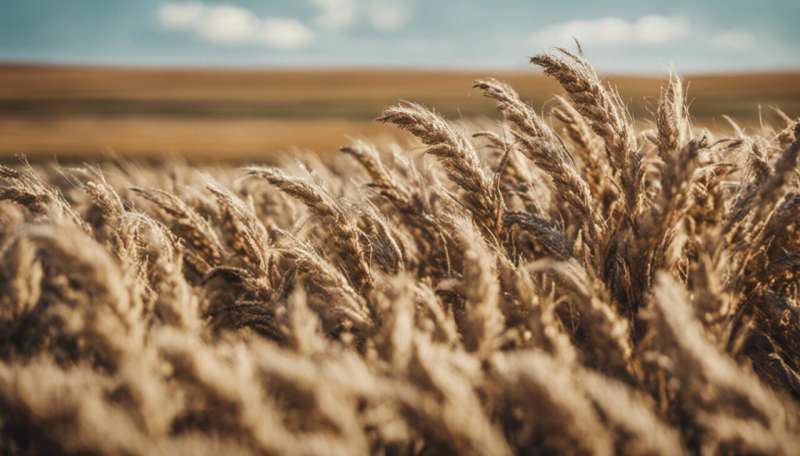This article has been reviewed according to Science X's editorial process and policies. Editors have highlighted the following attributes while ensuring the content's credibility:
fact-checked
trusted source
proofread
Farms are especially suitable for energy sharing, say researchers

Picture this: two farms—one growing tomatoes and the other producing dairy—decide to install solar panels on their properties and share electricity with each other.
The tomato farm provides extra electricity to the dairy farm during the hot summer months when refrigeration demands more electricity, while the dairy farm returns the favor in winter, extending the tomato-growing season.
Both farms help each other and engage in a symbiotic relationship that is called peer-to-peer (P2P) energy trading. In short, P2P uses digital technologies to distribute renewable energy, along with energy storage, across multiple users all connected under the same network.
Only single households allowed
In Norway, however, this kind of energy production sharing is currently not allowed by existing energy market regulations. Only single households are currently allowed to sell excess electricity to the grid via what is called the prosumption scheme ("plusskundeordningen" in Norwegian).
A prosumer is an individual who both consumes and produces a good or service, which in this case is electricity.
Nevertheless, farms, among different businesses, are especially suitable for this type of energy sharing because they often have numerous single-purpose buildings like barns, warehouses, and grain silos with unused space. By adopting low-carbon technologies like solar power, these spaces can be repurposed for energy production.
Many benefits
The benefits of this energy sharing model are many. First, it can help farmers reduce their electricity bills, freeing up income for expanding or modernizing facilities and diversifying farming practices. By using renewable energy technologies as the production source, farmers also contribute to Norway's decarbonization efforts.
This is also a cost-effective long-term strategy from the state perspective, considering that Norway's farming sector receives significant government subsidies. All the earnings received from shared energy production could potentially help farmers reduce their dependence on the state in the long run.
But the benefits of a policy that allows energy sharing would extend beyond farming communities. Changes in legislation could also benefit surrounding neighborhoods, schools, community centers, and sports facilities.
Farms could provide affordable electricity when it's most needed, such as during certain weeks when power costs are typically higher due to lower energy production from large-scale hydropower plants or during holidays when energy demand usually increases.
Intermittent energy sources essential
Norway has also recently faced public opposition to onshore wind power infrastructure, largely due to foreign ownership and ambiguous benefits for the affected communities.
Allowing farmers to produce energy on their property could reduce reliance on contentious large-scale power projects while keeping renewable energy production in local hands and increasing the share of energy produced by low-carbon sources.
Furthermore, restructuring Norway's grid infrastructure to accommodate diverse, intermittent energy sources will be essential in the shift towards an electrified society. If carefully integrated, self-sustaining farming collectives could help relieve pressure on the collective grid.
Apart from the numerous benefits listed above, research shows that the Norwegian farmers themselves are interested in these kinds of opportunities. In fact, a growing number of farming communities over recent years have expressed interest in starting initiatives like these. Some farmers have said that future cooperation will not only depend on the creation of a regulatory framework for such energy sharing, but financial support to initiate pilot projects, which are seen as crucial learning experiences for further development.
Norway needs to be open
Energy sharing offers many benefits, and Norwegian farmers are certainly interested. The next step includes a more proactive attitude from the current government.
As a country that prides itself in its capabilities to foster a democracy where diverse interests can coexist, Norway needs to be open to potential opportunities that the transition towards renewable energy can provide for society.
Cutting-edge technology is paving the way for new forms of collaboration that can benefit everyone. Engaging farmers in these collaborations is particularly meaningful, as there is growing interest among them to expand their businesses and contribute to the common good.
The benefits from allowing farmers to sell or trade energy among themselves are clear. Now all that is needed is a dialog between the state and the farming sector, so that we can all work towards a better and more sustainable future.
More information: Engaging the public for citizen energy production in Norway: Energy narratives, opportunities and barriers for an inclusive energy transition. In Energy Transition in the Baltic Sea Region.
Rudus, K. (2023). Community energy in question: Two energy transition visions in Norway. Forthcoming.
















